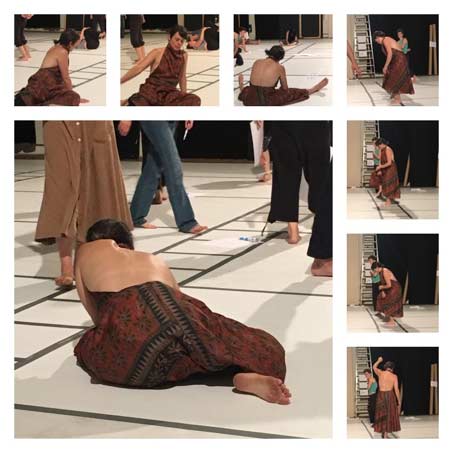on beauty: an unexpected debate
Things that make me happy, f.ex.
The beautiful dress of Deirdre Morris

There are some moments in life when beauty appears unexpected. While watching a workshop my eyes caught the dress of a participant. It was not only the dress and its texture which fascinated me. It was the melting of the enveloped body with the movements of the individuum. It expressed such a lightness in movement and colour combined with a beautiful piece of silk material: A perfect balance of surface and inner attitude.
Maybe it was unexpected, but not by chance. For a long time I thought about this moment of unexpected beauty and remembered the words of photographer Bill Cunningham (1929-2016):
„He who seeks beauty will find it.“
Friederike Lampert
(Research Group REFLEX Europe)
> reflections.
What kind of sensation does seeing beauty provide you with?
How does it change the way you relate to the world?
How does meeting beauty change your perspective?
How does the change of perspective inform your decision making process?
What are you more likely to do after witnessing a moment of beauty that you wouldn't do otherwise?
> more reflections.
It seems to me that in the past beauty (the notion of) used to be more present as topic of debate than it is today. Why is it that we don't debate beauty any longer? What was it about debating beauty that was relevant in the past and isn’t any longer? When was it that beauty started to revolve around standards that one could choose to identify with or not? When is it that beauty stopped being a matter of shared concern and became a matter of individual identity? When is it that beauty became concluded in the expression of a thing, not in the debate following the public exposure of the things?
Sayings such as "beauty is in the eye of the beholder,” or "he who seeks beauty will find it” – both inform of the fact that it is she who seeks that is in charge. Following this reasoning, beauty cannot be understood as a non-negotiable value and a constitutive element of “the beautiful thing.” “The beautiful thing” must be primarily allowed to be the thing that it is. Whether it is recognised as beautiful by the seeker of beauty should be, so to speak, an added bonus.
The reason I am interested in making this distinction is the following. A thing that is responsible for being a thing in its own right, whilst not also being responsible for being a thing of beauty affords 1) the thing itself to possibly become more than it could become if constricted in its becoming by the ever-temporary standards of beauty and 2) [it affords] the seeker a possible wider range of reaction when relating to the thing. In the case the seekers are afforded a possible wider range of reaction when relating to the thing, one seeker might recognise the thing of beauty when another does not – without either one of the seeker’s judgements threatening the fact that the thing is still a thing, valuable in its own right – whether or not it is also beautiful.
The final distinction I would like to make is a temporal one. When the thing is a thing in its own right, it inhabits in its own time. The time of the debate, when beauty or another feature of the thing is discussed, follows. Which is to say that the two are not inhabiting the same time. This means at least one thing, and that is that there is more time. The time to seek (the time of observation) and the time to debate (the time of reflection). Alternatively, the time for observation might be different from the time of reflection, might be different from time of debate. Which means even more time. What having more time affords, especially in human relationships I suppose, is less stress. What less stress affords, especially in human relationships I suppose, is a lesser pressure to arrive at any one conclusion, any one agreement. And what less pressure to arrive at any one conclusion, any one agreement affords, especially in human relationships I suppose, is a possibility for difference, nuance, and distinction to survive reduction. I.e. extinction.
The way I see it, documenting corresponds with the time of reflection. Reading, writing in response, engaging in an exchange and a conversation, in the virtual or real space, is equivalent to engaging in the time of debate. In the case of IDOCDE, as I’m sure is true to many walks of life (especially when dancing is at stake), time for reflection and time for debate can come days, months, sometimes years after the time of observation. This might mean that on a superficial level something of a momentum is lost. But what is gained in the loss of momentum is time for another kind of activity, perhaps a deeper one, perhaps a more articulate one – where language is formed, where reflection is made.
And how difference is preserved.
Dear members of the IDOCDE community,
I hope this editorial informs you and inspires you to continue exploring ways in which to use this platform, as a result of which I hope you expand your vocabularies, strengthen your senses of belonging and encourage yourselves to think about the work you’re doing as socio-politically relevant. Especially in this day and age.
Yours truly,
pavleheidler
co-editor
